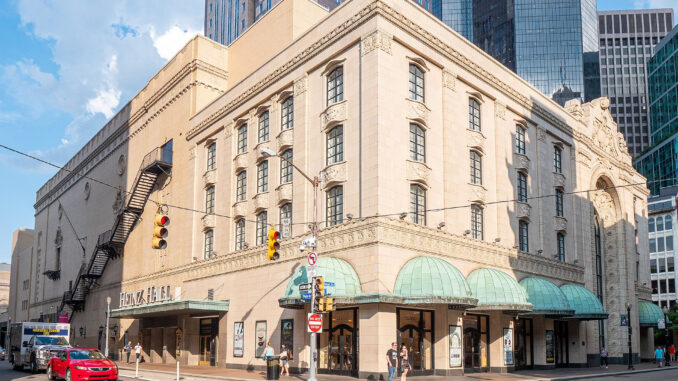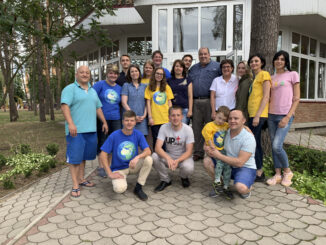
Olivia Burik
staff writer
1/28/21
When the COVID-19 pandemic forced many states into lockdown, concert halls around the nation went silent.
Jim Rodgers, principal contrabassoonist of the Pittsburgh Symphony Orchestra, recalled March 13, 2020 as the day everything changed.
“We were told to go home and that we were going to be initiating lockdown,” Rodgers said.
With rising fears of the spread of COVID-19, the PSO was not the only group to halt its plans.
Rachel Stegeman, a Pittsburgh-based violinist, was normally involved in multiple ensembles throughout the year.
Wheeling Symphony Orchestra, where Stegeman serves as concertmaster, was the last ensemble she rehearsed with before the shutdown in March.
“We did the whole rehearsal, and at the very last second, the board came on stage and said, ‘we can’t have the concert,’” Stegeman said.
Despite the abrupt end to the season, she described feeling a sense of closure.
“That dress rehearsal really felt like a concert somehow. It had exceptional energy and passion,” Stegeman said.
Once the nation traded suits for sweatpants and the workday commute for instant Zoom meetings, the classical music world began to adapt in its own ways.
The musicians of the Pittsburgh Symphony Orchestra released online content throughout the onset of the pandemic.
“We actually realized that we could still connect with our audiences and with the community through video and social media,” Rodgers said.
According to Rodgers, “Sunday Night Live concerts” featured different individual musicians each week. The “Practice! Practice! Practice!” segment provided guidance for young musicians. “Bright Spots” were videos of short pieces recorded by musicians who then spoke of their personal connection to the music.
An ongoing video series, “Front Row,” features small groups of PSO musicians playing in Heinz Hall as well as other well-known local backdrops.
Social distancing, mask wearing, and self-assessments of health were required for the PSO musicians to return to work.
Both Rodgers and PSO second/utility trombone James Nova emphasized the importance of safety for everyone, while also acknowledging the danger of COVID-19 for wind and brass players, who directly rely on their respiratory health for their careers.
Beyond their online presence, some PSO musicians participated in local “porch concerts” for limited audiences, according to Rodgers. He participated in a few of the weekly Sunday concerts in the Highland Park neighborhood.
“I remember we played our first piece, and I heard applause. And I almost started crying because I was thinking I haven’t heard applause…since the middle of March,” Rodgers said.
PSO cellist Karissa Shivone performed as part of a socially-distanced and masked string quartet for a drive-in concert in Homestead. The performance included several movements from Mozart string quartets. A large screen projected the live performance, and the audio was accessible to audience members in their cars via radio, according to Shivone.
The Pittsburgh Opera put together a production of Mozart’s “Cosi fan tutte” with a modified ensemble size and run time for a limited audience.
Charles Stegeman, violinist and husband to Rachel Stegeman, is the concertmaster of the Pittsburgh Opera and Pittsburgh Ballet Theatre Orchestras. Rachel is the assistant/associate concertmaster for both groups.
Charles Stegeman said that the normal orchestra size for a production of “Cosi fan tutte” is about 35 to 55 players. The Pittsburgh Opera’s performances cut that number to 13. The audience appeared to be around 30 people in total, according to Stegeman. The production took place at the opera company’s building in the Strip District.
According to Charles Stegeman, instrumentalists who could not wear masks due to the technicalities of their respective instruments were spaced 10 feet apart from each other, with plastic sheets to catch any droplets. The string and percussion sections were also separated from the winds and brass. Vocalists wore specialized masks.
The Wheeling Symphony Orchestra also performed live, including one outdoor concert and a few concerts live streamed remotely in Oglebay for socially-distant ballroom dinners, according to concertmaster Rachel Stegeman.
Also concertmaster of the Youngstown Symphony Orchestra, Rachel Stegeman led a chamber orchestra concert in November at the DeYor Performing Arts Center for a socially-distanced audience of 100.
Beyond the organizational level, many individual musicians took the time to engage in projects of their own.
Nova, a PSO trombonist, said he has used the extra time to work on his audio and video skills, producing his own content and also assisting other musicians with their projects.
“I have treated this as an unplanned sabbatical,” Nova said.
Contrabassoonist Rodgers said he found himself frequently using the Acapella app, where users can layer multiple videos to create harmony, as a way to create content for the PSO as well as for his own use.
Cellist Shivone began to experiment with writing new arrangements of music for both herself and her husband, a bass baritone in the Pittsburgh Opera. The duo was featured in one of the PSO musicians’ “Sunday Night Live” performances.
Rachel and Charles Stegeman moved their annual violin and viola summer camps completely online and even found the virtual versions to be more effective in some respects.
Though many musicians and music organizations have found ways to innovate in this unprecedented era, the adjustment to the new normal has been difficult.
Without the live element of “high pressure concerts,” many “powerhouse players” began to feel “rudderless,” said Nova.
Shivone said she especially misses greeting audience members before concerts, a somewhat new tradition for the PSO.
“It was a great opportunity to get to know the people who love the orchestra and wanted to be there every week,” Shivone said.
Even more disheartening is the fear that some orchestras may not be able to survive this pandemic.
“I do definitely worry about some of the smaller orchestras in the country,” Shivone said.
She said that community ensembles can play a crucial role in the development of a young musician, and she hopes that future generations are able to benefit from these opportunities.
But it isn’t just the smaller organizations that are being affected.
Perhaps most shocking to the classical music industry was the New York City-based Metropolitan Opera’s decision to cancel its entire 2020-2021 season and leave many musicians without pay.
“Because of the lack of protection in their contract and the lack of sympathy and support of their management, they were basically let go without any indication of when they would come back,” Rodgers said.
The Met is “going to pay an enormous artistic cost for decades because of this,” trombonist Nova said. “Musicians have a long memory.”
However, there is still hope for other orchestras who are pulling through with the support of donors and subscribers.
“I’m kind of an eternal optimist. I believe that when things do have the chance to bounce back, they’re going to bounce back incredibly strongly,” said Rodgers.
Shivone mentioned that her music-making used to feel more about herself, but she now sees it as a gift of healing, something she believes the world will desperately need after the tragedy of the COVID-19 pandemic.
“I think people have realized, now that we’re not able to have [live music], how important it is to us all,” Shivone said.


